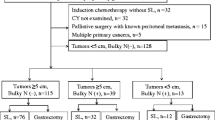Abstract
Background
Staging laparoscopy has been shown to be useful for increasing the accuracy of preoperative staging. However, controversy still exists regarding patient selection and subsequent treatment. The aim of this study was to determine the role of staging laparoscopy for a group that has a policy to perform aggressive surgery for advanced gastric cancer.
Methods
Twenty-four patients with clinical T3 or T4 gastric cancer expected to undergo curative resection, based on conventional preoperative diagnostic methods underwent staging laparoscopy. We examined the accuracy and the impact of staging laparoscopy on the further treatment options.
Results
The mean running time for the staging laparoscopy was 40.7 min (range: 25–75 min), and one complication was noted (4.2%). In regard to the tumor depth, 11 of 24 (45.8%) cases had a discrepancy after staging laparoscopy. In addition, 15 of 24 patients (62.5%) were found to have unsuspected peritoneal metastases, and 8 patients (33.3%) were excluded from laparotomy. The remaining 16 patients (66.7%), including 9 patients with localized peritoneal metastases (P1), underwent resection. The diagnostic accuracy for T factor was 81.3% in 16 laparotomy cases and overall accuracy of P factor was 91.7%.
Conclusions
Staging laparoscopy had a significant impact on decisions regarding the treatment plan in patients with advanced gastric cancer for a group that has an aggressive treatment strategy.


Similar content being viewed by others
References
Sugarbaker PH, Yonemura Y (2000) Clinical pathway for the management of respectable gastric cancer with peritoneal seeding: best palliation with a ray of hope for cure. Oncology 58:96–107
Yonemura Y, Sawa T, Kinoshita K, et al. (1993) Neoadjuvant chemotherapy for high-grade advanced gastric cancer. World J Surg 17:256–261
Cunningham D, Allum WH, Stenning SP, et al. (2006) Perioperative chemotherapy versus surgery alone for respectable gastroesophageal cancer. N Engl J Med 355:11–20
Yao JC, Ajani JA (2002) Therapy of localized gastric cancer: preoperative and postoperative approaches. Ann Oncol 13:7–12
Yano M, Tsujinaka T, Shiozaki H, et al. (2000) Appraisal of treatment strategy by staging laparoscopy for locally advanced gastric cancer. World J Surg 24:1130–1135
Yonemura Y, Kawamura T, Bandou E, et al. (2005) Treatment of peritoneal dissemination from gastric cancer by peritonectomy and chemohyperthermic peritoneal perfusion. Br J Surg 92:370–375
Japanese Research Society for Gastric Cancer. (1995) The general rules for gastric cancer study, 1st English edition. Tokyo, Kanehara Shuppan
Stell DA, Carter CR, Stewart I, et al. (1996) Prospective comparison of laparoscopy, ultrasonography and computed tomography in the staging of gastric cancer. Br J Surg 83:1260–1262
D’Ugo DM, Pende V, Persiani R, et al. (2003) Laparoscopic staging of gastric cancer. J Am Coll Surg 196:965–974
Davies J, Chalmers AG, Sue-Ling HM, et al. (1997) Spiral computed tomography and operative staging of gastric carcinoma: a comparison with histopathological staging. Gut 41:314–319
Siewert JR (2000) Invited commentary. World J Surg 24:1135–1136
Ishida H, Murata N, Yamada H, et al. (2000) Influence of trocar placement and CO2 pneumoperitoneumon port site metastases. Surg Endosc 14:193–197
Yajima K, Kanda T, Ohashi M, et al. (2006) Clinical and diagnostic significance of preoperative computed tomography findings of ascites in patients with advanced gastric cancer. Am J Surg 192:185–190
Burke EC, Karpeh MS, Conlon KC, et al. (1997) Laparoscopy in the management of gastric adenocarcinoma. Ann Surg 225:262–267
Samarasam I, Chandran BS, Sitaram V, et al. (2006) Gastric malignancy: p;alliative gastrectomy in advanced gastric cancer: is it worthwhile? Aust N Z J Surg 76:60–63
Hanazaki K, Sodeyama H, Mochizuki Y, et al. (2001) Palliative gastrectomy for advanced gastric cancer. Hepatogastroenterology 48:285–289
Maekawa S, Saku M, Maehara Y, et al. (1996) Surgical treatment for advanced gastric cancer. Hepatogastroenterology 178–186
Sugarbaker PH, Yu W, Yonemura T (2003) Gastrectomy, peritonectomy and perioperative intraperitoneal chemotherapy: the evolution of treatment strategies for advanced gastric cancer. Semin Surg Oncol 21:233–248
Ouchi K, Sugawara T, Ono H, et al. (1998) Therapeutic significance of palliative operations for gastric cancer for survival and quality of life. J Surg Oncol 69:41–44
Lordick F, Stein HJ, Peschel C, et al. (2004) Neoadjuvant therapy for oesophagogastric cancer. Br J Surg. 91:540–551
Ajani JA, Ota DM, Jessup JM, et al. (1991) Resectable gastric carcinoma. An evaluation of preoperative and postoperative chemotherapy. Cancer 68:1501–1506
Fink U, Schuhmacher C, Stein HJ, et al. (1995) Preoperative chemotherapy for stage III–IV gastric carcinoma: feasibility, response and outcome after complete resection. Br J Surg 82:1248–1252
Rougier P, Mahjoubi M, Lasser P, et al. (1994) Neoadjuvant chemotherapy in locally advanced gastric carcinoma-a phase II trial with combined continuous intravenous 5-fluorouracil and bolus cisplatinum. Eur J Cancer 30:1269–1275
Crookes P, Leichman CG, Leichman L, et al. (1997) Systemic chemotherapy for gastric carcinoma followed by postoperative intraperitoneal therapy: a final report. Cancer 79:1767–1775
Bentrem D, Wilton A, Mazumdar M, et al. (2005) The value of peritoneal cytology as a preoperative predictor in patients with gastric carcinoma undergoing a curative resection. Ann Surg Oncol 12:1–7
Abe S, Yoshimura H, Tabara H, et al. (1995) Curative resection of gastric cancer: limitation of peritoneal lavage cytology in predicting the outcome. J Surg Oncol 59:226–229
Mortensen MB, Fristrup CW, Ainsworth AP, et al. (2006) Combined preoperative endoscopic and laparoscopic ultrasonography for prediction of R0 resection in upper gastrointestinal tract cancer. Br J Surg 93:720–725
Author information
Authors and Affiliations
Corresponding author
Additional information
This paper was supported in part by the Catholic Cancer Center.
Rights and permissions
About this article
Cite this article
Song, K.Y., Kim, J.J., Kim, S.N. et al. Staging Laparoscopy for Advanced Gastric Cancer: Is It Also Useful for the Group Which has an Aggressive Surgical Strategy?. World J Surg 31, 1230–1235 (2007). https://doi.org/10.1007/s00268-007-9017-3
Published:
Issue Date:
DOI: https://doi.org/10.1007/s00268-007-9017-3




